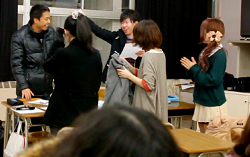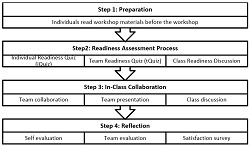While each classification of adult education programs may seem mutually exclusive, most perspectives could serve a role for considering options in an adult education program. However, no single philosophy alone seems to be prescriptive. Many philosophies are finding interesting applications in surprising environments. Applications of Marxist Theory in capitalist organizations provide an example of an unexpected application. Marxism has traditionally been a philosophy intended to bring down capitalist institutions. However, having proven a practical philosophy for governments to control entire populations, elements of Marxist Theory have emerged in western capitalist organizations packaged as “Organizational Theory.” Organizational Theory provides organizations with strategies to effectively align the activities of individuals and groups to collectively work to meet organizational objectives, sometimes against the interests of the individual.
Regarding the myopic limitations of relying on a single philosophy for academic programs, adult education practice in the United States leans toward pluralism rather than dogmatism. This is reflected in arguments proposed by Houle [8] for pragmatic utilitarianism, Cross [9] for practice to match the characteristics of the learner, and Maehl [1] to apply methods relevant to the context, as follows:
Pragmatic utilitarianism
After identifying six philosophies upon which planners tend to design educational programs, Houle [8] asserted that none of the philosophies dominates adult education. Houle proposed that practitioners should not consider a single approach but adopt flexible planning that accommodates a broad range of methods while applying the specific application for each event. In this “pragmatic utilitarianism,” the learning goal drives the choice of doctrine and application [8, pp. 70-71]. Divergent philosophies help guard against dogmatism while allowing the market to meet adult learners’ diverse needs and interests.
Characteristics
Cross [9] argued that learning programs should address the learner’s unique needs rather than the institution’s philosophical needs. Cross attempted to integrate andragogy, experiential learning, and lifespan psychology to identify the distinctive personal and situational Characteristics of Adult Learners (CAL), as follows:
- Both positive and negative factors influence motivation.
- Anticipated learning outcomes affect participation.
- A need for security precedes the need for achievement.
- The expectation of reward affects motivation.
According to Cross’ CAL model, adult learning programs should do the following:
- Build on the experience of participants.
- Adapt to the age limitations of the participants.
- Challenge learners to increasingly advance through personal developmental stages.
- Provide choice in availability and organization of learning programs.
In short, effective adult education programs will center on applying the combination of theories that meet the unique needs of adult learners.
Context
Maehl [1] built on Cross’ observations by pointing out that no single theory is adequate by itself. Various methods carry validity as long as they are “deliberate, respectful of the educational ends sought and cognitive of the circumstances of the learning event” [1, p. 39]. Merriam et al. [6] echoed that no single philosophy explains adult learning. Instead, most theories seem interconnected. Each provides elements that allow educators to build an eclectic practice that meets contextual needs.




